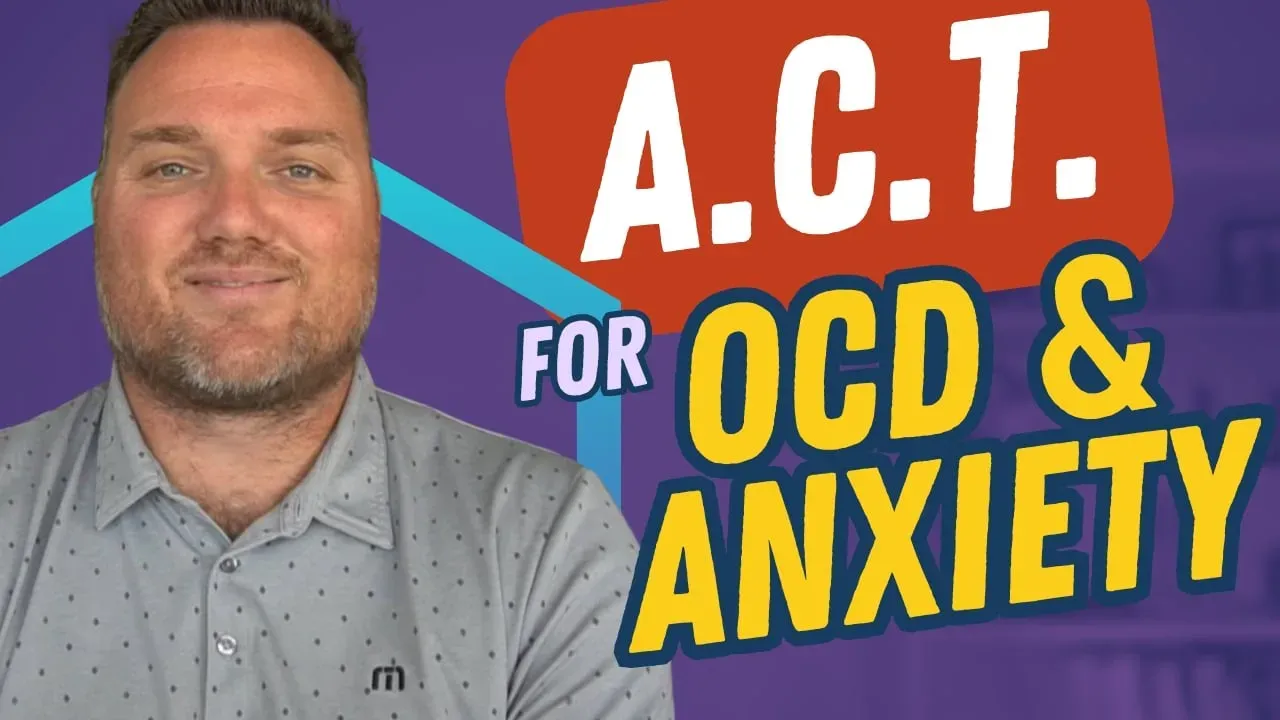ACT for OCD & Anxiety: Build Psychological Flexibility with Acceptance & Commitment Therapy
Apr 30, 2025
Understanding ACT for OCD & Anxiety: How Acceptance Commitment Therapy Can Help You Break the OCD & Anxiety Loop
Are you struggling with intrusive thoughts, anxiety, or the relentless loop of OCD? You’re not alone, and there’s hope with evidence-based approaches like Acceptance Commitment Therapy (ACT). In this post, we’ll provide a high-level overview of ACT for OCD and anxiety, including how it works, its core principles, and why it can be a valuable tool—especially when used alongside exposure and response prevention (ERP). If you’ve ever wondered how to stop fighting your anxious thoughts or how to live more flexibly with your emotions, read on to discover how ACT could be the key!
What Is Acceptance Commitment Therapy (ACT)?
Acceptance Commitment Therapy, or ACT, is a therapeutic approach designed to help individuals increase psychological flexibility. Unlike approaches that focus solely on symptom reduction, ACT encourages you to accept your thoughts and feelings—without judgment or resistance—and to commit to living a meaningful, values-driven life. At its core, ACT is not about eliminating anxiety or intrusive thoughts, but rather about learning how to coexist with them in a healthy way.
ACT and OCD: Complementary to ERP, Not a Replacement
One common misconception is that ACT is simply an alternative to ERP (Exposure and Response Prevention)—the gold standard for OCD treatment. As Matt, the presenter from Restored Minds, points out in the episode, ACT isn’t a replacement for ERP. Instead, it’s often used in conjunction with ERP, or seen as a different way of understanding and implementing its principles.
“It does an incredible disservice to what ACT is really capable of… because it’s really not a replacement for something like ERP as much as it’s more used in conjunction with it.”
– Matt, Presenter
The Six Core Tenets of ACT
What makes ACT unique is its structured framework, made up of six key pillars:
-
Self as Context (vs. Self as Content):
Learning to observe your thoughts and feelings without being defined by them.
-
Cognitive Defusion (vs. Cognitive Fusion):
Techniques to distance yourself from unhelpful thoughts.
-
Acceptance:
Allowing thoughts, emotions, and sensations to be present without trying to suppress or control them.
-
Present Moment Awareness:
Increasing mindfulness and living in the here and now.
-
Values-Based Decisions:
Identifying what truly matters to you and letting that guide your actions.
-
Committed Action:
Taking steps aligned with your values, regardless of what your mind throws at you.
All these together foster one vital outcome: psychological flexibility.
The Goal of ACT: Psychological Flexibility
ACT’s primary intention is to cultivate psychological flexibility. This means being able to adapt to life’s ups and downs—without letting every anxious thought or feeling throw you off course. Instead of constantly battling to control or avoid unwanted experiences (like intrusive thoughts or anxiety), ACT teaches you to make space for them, recognizing that they are a normal part of human life.
“The outcome of ACT is psychological flexibility… We want to be able to handle the natural unfolding of life and internally be flexible enough to where we can navigate our own internal environment.”
– Matt, Presenter
Trying to use ACT as a tool to eliminate anxiety or intrusive thoughts is actually counterproductive. The real power of ACT is in learning to coexist with discomfort, rather than fighting it.
Why Suppressing Thoughts and Feelings Doesn't Work
If you’ve been struggling with OCD or anxiety, you might relate to the urge to suppress or control unwanted thoughts and feelings. But as the presenter points out, “all that does is just like a big lid on a tea kettle or a pressure cooker. It builds up this energy to the point where one oftentimes explodes.” Learning acceptance is key to releasing this built-up pressure and breaking free from the anxiety loop.
Acceptance in Practice: More Than Just a Concept
Many people understand acceptance as a concept, but few know how to truly implement it. ACT provides practical exercises to help you experience acceptance, rather than just think about it. This means accepting thoughts and emotions in a non-resistant state, which allows them to surface and pass naturally.
ACT for OCD and Anxiety: What to Expect at the Restored Minds Workshop
If you’d like to go deeper, Matt will be presenting on ACT at the OCD SoCal conference on May 3, 2025, at Orange Coast College. He’ll be covering:
-
In-depth exploration of the six pillars of ACT
-
The different levels of consciousness
-
Practical exercises for acceptance and release
-
Live Q&A
The workshop is affordable, open to all, and lunch is included!
Conclusion
Acceptance Commitment Therapy (ACT) offers powerful tools for anyone dealing with OCD, anxiety, intrusive thoughts, or panic. Its focus on psychological flexibility and living aligned with your values can transform your relationship with difficult thoughts and feelings. Remember: The goal isn’t to get rid of anxiety—it’s to learn how to live well, even when it shows up.
Interested in learning more or connecting in person? Find the conference link in the video description. Everyone is welcome!
Ready to stop fighting your thoughts? Embrace ACT and start your journey to greater psychological flexibility today.


